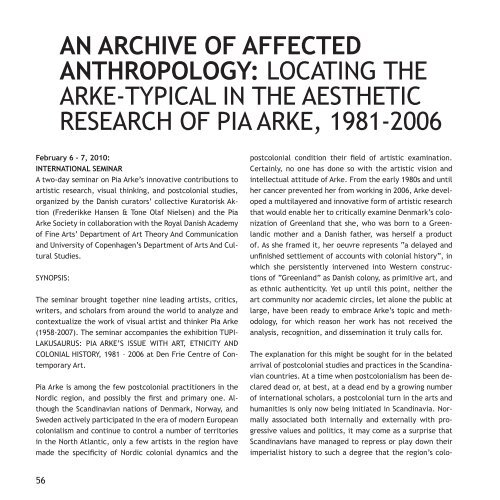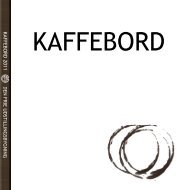læs bogen her - Den Frie
læs bogen her - Den Frie
læs bogen her - Den Frie
You also want an ePaper? Increase the reach of your titles
YUMPU automatically turns print PDFs into web optimized ePapers that Google loves.
February 6 – 7, 2010:<br />
INTERNATIONAL SEMINAR<br />
A two-day seminar on Pia Arke’s innovative contributions to<br />
artistic research, visual thinking, and postcolonial studies,<br />
organized by the Danish curators’ collective Kuratorisk Aktion<br />
(Frederikke Hansen & Tone Olaf Nielsen) and the Pia<br />
Arke Society in collaboration with the Royal Danish Academy<br />
of Fine Arts’ Department of Art Theory And Communication<br />
and University of Copenhagen’s Department of Arts And Cultural<br />
Studies.<br />
SYNOPSIS:<br />
The seminar brought toget<strong>her</strong> nine leading artists, critics,<br />
writers, and scholars from around the world to analyze and<br />
contextualize the work of visual artist and thinker Pia Arke<br />
(1958-2007). The seminar accompanies the exhibition TUPI-<br />
LAKUSAURUS: PIA ARKE’S ISSUE WITH ART, ETNICITY AND<br />
COLONIAL HISTORY, 1981 – 2006 at <strong>Den</strong> <strong>Frie</strong> Centre of Contemporary<br />
Art.<br />
Pia Arke is among the few postcolonial practitioners in the<br />
Nordic region, and possibly the first and primary one. Although<br />
the Scandinavian nations of <strong>Den</strong>mark, Norway, and<br />
Sweden actively participated in the era of modern European<br />
colonialism and continue to control a number of territories<br />
in the North Atlantic, only a few artists in the region have<br />
made the specificity of Nordic colonial dynamics and the<br />
56<br />
AN ARCHIVE OF AFFECTED<br />
ANTHROPOLOGY: LOCATING THE<br />
ARKE-TYPICAL IN THE AESTHETIC<br />
RESEARCH OF PIA ARKE, 1981-2006<br />
postcolonial condition their field of artistic examination.<br />
Certainly, no one has done so with the artistic vision and<br />
intellectual attitude of Arke. From the early 1980s and until<br />
<strong>her</strong> cancer prevented <strong>her</strong> from working in 2006, Arke developed<br />
a multilayered and innovative form of artistic research<br />
that would enable <strong>her</strong> to critically examine <strong>Den</strong>mark’s colonization<br />
of Greenland that she, who was born to a Greenlandic<br />
mot<strong>her</strong> and a Danish fat<strong>her</strong>, was <strong>her</strong>self a product<br />
of. As she framed it, <strong>her</strong> oeuvre represents “a delayed and<br />
unfinished settlement of accounts with colonial history”, in<br />
which she persistently intervened into Western constructions<br />
of “Greenland” as Danish colony, as primitive art, and<br />
as ethnic authenticity. Yet up until this point, neit<strong>her</strong> the<br />
art community nor academic circles, let alone the public at<br />
large, have been ready to embrace Arke’s topic and methodology,<br />
for which reason <strong>her</strong> work has not received the<br />
analysis, recognition, and dissemination it truly calls for.<br />
The explanation for this might be sought for in the belated<br />
arrival of postcolonial studies and practices in the Scandinavian<br />
countries. At a time when postcolonialism has been declared<br />
dead or, at best, at a dead end by a growing number<br />
of international scholars, a postcolonial turn in the arts and<br />
humanities is only now being initiated in Scandinavia. Normally<br />
associated both internally and externally with progressive<br />
values and politics, it may come as a surprise that<br />
Scandinavians have managed to repress or play down their<br />
imperialist history to such a degree that the region’s colo-



